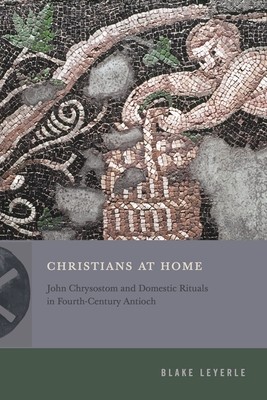
- We will send in 10–14 business days.
- Author: Blake Leyerle
- Publisher: Penn State University Press
- ISBN-10: 0271097388
- ISBN-13: 9780271097381
- Format: 15.2 x 22.9 x 1.3 cm, kieti viršeliai
- Language: English
- SAVE -10% with code: EXTRA
Reviews
Description
What did it mean for ordinary believers to live a Christian life in late antiquity? In Christians at Home, Blake Leyerle explores this question through the writings, teachings, and reception of John Chrysostom--a priest of Antioch who went on to become the bishop of Constantinople in 397 AD.
Through elaborate spatial and ritual recommendations, Chrysostom advised listeners to turn their houses into churches. He preached that prayer and chant, scripture and hospitality, and even layout and furnishings would create an immersive environment with a transformational effect on a home's inhabitants. But as Leyerle shows, the actual practices and beliefs of Chrysostom's lay listeners diverged from his intentions. Unlike their preacher, the laity--who saw time as cyclical rather than linear--were neither interested in moral transformation nor concerned about the afterlife, and they were more motivated by tangible goods than by a life of monasticism. Yet they were committed to Christianity and demonstrated this by modifying Chrysostom's advice to meet their everyday experiences, often citing precedents from scripture to defend their actions.
By reading these two perspectives on early Christian life through each other, Leyerle shows the clash of beliefs between Chrysostom and his lay listeners and, at the same time, highlights the shared understandings that bound them together. For both the preacher and his congregations, lived religion was necessarily rooted in practice, within which the household was a vital ritual arena, independent of clerical control. Elegantly written and convincingly argued, this study will appeal to scholars of theology, classics, and the history of Christianity in particular.
EXTRA 10 % discount with code: EXTRA
The promotion ends in 23d.13:47:06
The discount code is valid when purchasing from 10 €. Discounts do not stack.
- Author: Blake Leyerle
- Publisher: Penn State University Press
- ISBN-10: 0271097388
- ISBN-13: 9780271097381
- Format: 15.2 x 22.9 x 1.3 cm, kieti viršeliai
- Language: English English
What did it mean for ordinary believers to live a Christian life in late antiquity? In Christians at Home, Blake Leyerle explores this question through the writings, teachings, and reception of John Chrysostom--a priest of Antioch who went on to become the bishop of Constantinople in 397 AD.
Through elaborate spatial and ritual recommendations, Chrysostom advised listeners to turn their houses into churches. He preached that prayer and chant, scripture and hospitality, and even layout and furnishings would create an immersive environment with a transformational effect on a home's inhabitants. But as Leyerle shows, the actual practices and beliefs of Chrysostom's lay listeners diverged from his intentions. Unlike their preacher, the laity--who saw time as cyclical rather than linear--were neither interested in moral transformation nor concerned about the afterlife, and they were more motivated by tangible goods than by a life of monasticism. Yet they were committed to Christianity and demonstrated this by modifying Chrysostom's advice to meet their everyday experiences, often citing precedents from scripture to defend their actions.
By reading these two perspectives on early Christian life through each other, Leyerle shows the clash of beliefs between Chrysostom and his lay listeners and, at the same time, highlights the shared understandings that bound them together. For both the preacher and his congregations, lived religion was necessarily rooted in practice, within which the household was a vital ritual arena, independent of clerical control. Elegantly written and convincingly argued, this study will appeal to scholars of theology, classics, and the history of Christianity in particular.


Reviews